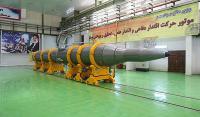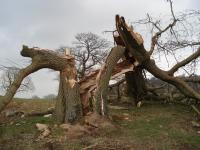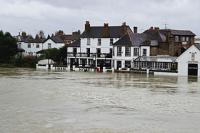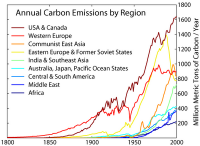-
Aussie stationery chain pulls world globe which names Palestine, omits Israel
The Australian stationery chain Typo has stumbled into one of the world’s most contentious issues – and had to pull a line of globes which named Palestine but omitted the label “Israel.” Israel’s name was not omitted altogether: The globe was designed so that Israel and twelve other small countries were represented by a number on the map, corresponding to a number in a legend at the base of the globe. The globe sparked charges of anti-Semitism, but the company’s decision to halt production of the globes has led to boycott threats by Palestine advocates.
-
-
Rapid, affordable energy transformation in U.S. possible
The United States could slash greenhouse gas emissions from power production by up to 78 percent below 1990 levels within fifteen years while meeting increased demand, according to a new study. The study used a sophisticated mathematical model to evaluate future cost, demand, generation, and transmission scenarios. It found that with improvements in transmission infrastructure, weather-driven renewable resources could supply most of the nation’s electricity at costs similar to today’s.
-
-
New regulations improve opportunities for certain highly skilled workers

DHS’ U.S. Citizenship and Immigration Services on Friday announced changes to the programs serving the H-1B1, E-3, and CW-1 nonimmigrant classifications, and the EB-1 immigrant classification. The purpose of the changes was to remove the obstacles and disadvantages workers in these categories faced compared to workers in other visa classifications.
-
-
World leaders urged to oppose encryption back doors
In an open letter made public on Monday, nearly 200 Internet and digital rights leaders and experts, companies, and organizations are calling on the Obama administration and other world leaders to reject efforts to create “back doors” to encryption. “Encryption tools, technologies, and services are essential to protect against harm and to shield our digital infrastructure and personal communications from unauthorized access,” the letter states.
-
-
Administration tries to harness Silicon Valley’s talent for fight against ISIS

Senior administration intelligence officials are meeting today (Friday) with Silicon Valley’s major technology firms — companies including Facebook, Twitter, Apple, Microsoft, YouTube , LinkedIn, Dropbox, and others — in an effort to recruit them and their technological know-how in the fight against radicalization and terrorism.
-
-
Extreme weather increasingly threatening U.S. power grid
Power outages related to weather take out between $18 billion to $33 billion from the nation’s economy. Analysis of industry data found that these storms are a growing threat to, and the leading cause of outages in, the U.S. electric grid. The past decade saw power outages related to bad weather increase, which means that power companies must find a way address this problem.
-
-
U.S. to impose new sanctions on Iran over ballistic missile program

The United States is preparing a new round of economic sanctions against Iran after Iran had violated agreements related to its ballistic missile program by testing, on 10 October, an advanced version of one of its missiles. The ballistic missile agreement is unrelated to the nuclear agreement the P5+1 powers signed with Iran last summer. The nuclear program-related sanctions would begin to be lifted in 2016 if Iran fully complies with the requirements of the nuclear deal.
-
-
Calls for tighter regulations of the design of toy guns

The death of people – often children – who carry BB or pellet guns resembling real weapons has prompted lawmakers and activists to call for tighter regulations on the design of non-lethal guns. California has already passed such a law, and it would go into effect on Friday.
-
-
As storms continue to batter U.K., estimates of cost rise

As Storm Frank – which is following on the heels of Storms Eva and Desmond — continues to batter England, Scotland, and Wales, estimates of the cost of the damage wrought continue to rise. The total economic loss caused by the three Storms may well breach £3 billion – and these projections do not include any government spending on flood defenses, estimated to be between £2.3 billion and £2.8 billion.
-
-
U.K.: Economic costs from flooding could reach £1.5bn, reduce GDP growth

Economic losses caused by the flooding which has devastated parts of Britain in the past few days could exceed 1.5 billion pounds, and shave 0.2-0.3 percent off GDP growth overall in the first quarter of 2016. Insurers will likely shoulder the bulk of the burden after first Storm Desmond and then Storm Eva saw waters swamp large swathes of the country.
-
-
Climate change losses for Southeast Asia well above previous estimate: ADB

Economic losses from the impacts of climate change in Southeast Asia could be 60 percent higher than previously estimated, reducing the region’s gross domestic product (GDP) by up to 11 percent by 2100, according to a new Asian Development Bank (ADB) study. The analysis is an update to a 2009 ADB report that estimated a 7 percent annual reduction in economic output due to climate change.
-
-
Growing risks in flood-prone areas due to economic growth more than climate change
Worldwide economic losses from river flooding could increase 20-fold by the end of the twenty-first century if no further actions on flood risk reduction are taken. There are two contributors to risks associated with river flooding. Floods’ frequency and severity (both influenced by climate change); and the exposure to floods of people and economic assets (determined by economic activity and human residency in flood-prone areas). Researchers calculate that in many flood-prone regions of the world, more than 70 percent of the increase in flood-related risks over the coming decades can be attributed to economic growth and residency patterns in flood prone areas.
-
-
Iranian hackers attacked New York dam

In 2013, Iranian government hackers infiltrated the control system of Bowman Avenue Dam in Rye, New York, located twenty-five miles from New York City. Using a cellular modem, the hackers could have released larger volumes of upstream water without warning. As dams go, the Rye dam is small at about 20ft tall. There was some confusion initially, as DHS and DOE thought a similarly named dam in Oregon — the Arthur R. Bowman Dam – was the one hacked. The Oregon dam, at 245 feet, is much bigger, and hacking its control systems could have had much more serious consequences.
-
-
U.S. reliance on nonfuel mineral imports increasing
Key nonfuel mineral commodities that support the U.S. economy and national security are increasingly being sourced from outside the U.S., according to a new U.S. Geological Survey report. Over the past sixty years, there has been an increase in the number and diversity of nonfuel commodities that the United States imports as well as the extent to which the United States is import reliant.
-
-
Terrorists used encrypted apps to plan, coordinate Paris attacks
The leaders of U.S. and European law enforcement and intelligence agencies have been explicit in their warnings: commercially available communication devices equipped with end-to-end encryption software make it impossible for security services to track terrorists plotting an attack – or monitor the terrorists’ communication while the attack is under way. Sources close to the investigation of the 13 November Paris terrorist attacks have now confirmed that the terrorists used the encrypted WhatsApp and Telegram messengers apps to communicate for a period before the attacks – and with each other during the attacks. What was said in those encrypted messages, and who sent and received these messages, may never be known, because the companies themselves do not have the key – or back door – to decrypt these messages. Thus, security services could not monitor such messages before an attack in order to prevent it, and cannot read these message after an attack to learn more about the terrorists’ network and support system.
-
More headlines
The long view
Ransomware Attacks: Death Threats, Endangered Patients and Millions of Dollars in Damages
A ransomware attack on Change Healthcare, a company that processes 15 billion health care transactions annually and deals with 1 in 3 patient records in the United States, is continuing to cause massive disruptions nearly three weeks later. The incident, which started on February 21, has been called the “most significant cyberattack on the U.S. health care system” by the American Hospital Association. It is just the latest example of an increasing trend.
Chinese Government Hackers Targeted Critics of China, U.S. Businesses and Politicians
An indictment was unsealed Monday charging seven nationals of the People’s Republic of China (PRC) with conspiracy to commit computer intrusions and conspiracy to commit wire fraud for their involvement in a PRC-based hacking group that spent approximately 14 years targeting U.S. and foreign critics, businesses, and political officials in furtherance of the PRC’s economic espionage and foreign intelligence objectives.
European Arms Imports Nearly Double, U.S. and French Exports Rise, and Russian Exports Fall Sharply
States in Europe almost doubled their imports of major arms (+94 per cent) between 2014–18 and 2019–23. The United States increased its arms exports by 17 per cent between 2014–18 and 2019–23, while Russia’s arms exports halved. Russia was for the first time the third largest arms exporter, falling just behind France.
LNG Exports Have Had No Impact on Domestic Energy Costs: Analysis
U.S. liquified natural gas (LNG) exports have not had any sustained and significant direct impact on U.S. natural gas prices and have, in fact, spurred production and productivity gains, which contribute to downward pressure on domestic prices.
